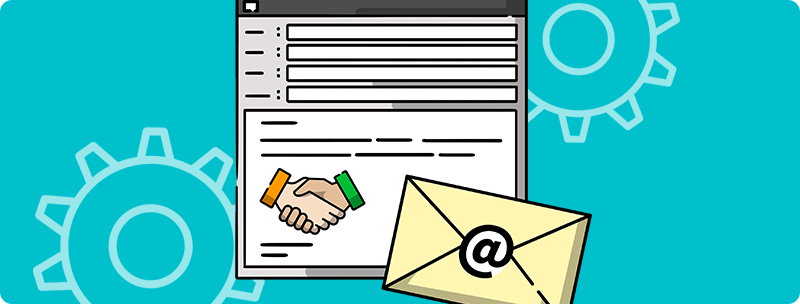5 practical tips to simplify communication so that everyone can understand
Written by Ryan Robinson| 10th November 2023

Looking to build meaningful connections with your audience?
Then you need to master the art of messaging.
More specifically, you need to learn how to simplify communication so everyone in your target audience can understand you.
Let’s quickly review five tips you can use to create strong and simple messages that resonate with your ideal customer.
Then you need to master the art of messaging.
More specifically, you need to learn how to simplify communication so everyone in your target audience can understand you.
Let’s quickly review five tips you can use to create strong and simple messages that resonate with your ideal customer.

1. Use a customer 360 view to summarize your target audience’s expectations and pain points
To simplify communication, get clear on who your target customer is.
Unfortunately, customers can use multiple channels and touchpoints with your business. And making sense of these data sets can feel overwhelming at best.
But with a customer 360 view, you can get holistic insights into your audience’s preferences and behavior in one place. You might be surprised by the insights in front of you if you’re used to piecing data together manually! With this single source of truth, you can get to the bottom of your audience’s core needs without question or confusion.
Once your 360 view is set up, examine the data patterns that reflect your customer’s expectations and pain points.
With this rich data in front of you, summarize your audience’s expectations, pain points, and the solutions you offer, like this:
Unfortunately, customers can use multiple channels and touchpoints with your business. And making sense of these data sets can feel overwhelming at best.
But with a customer 360 view, you can get holistic insights into your audience’s preferences and behavior in one place. You might be surprised by the insights in front of you if you’re used to piecing data together manually! With this single source of truth, you can get to the bottom of your audience’s core needs without question or confusion.
Once your 360 view is set up, examine the data patterns that reflect your customer’s expectations and pain points.
With this rich data in front of you, summarize your audience’s expectations, pain points, and the solutions you offer, like this:
Next, simplify communication by turning the above text into short, value-driven messages, hooks, and calls to action (CTAs). Use these on your website, landing pages, in ads, and in marketing campaigns.
For instance:
For instance:
Looking to build meaningful connections with your audience?
Then you need to master the art of messaging.
More specifically, you need to learn how to simplify communication so everyone in your target audience can understand you.
Let’s quickly review five tips you can use to create strong and simple messages that resonate with your ideal customer.
Then you need to master the art of messaging.
More specifically, you need to learn how to simplify communication so everyone in your target audience can understand you.
Let’s quickly review five tips you can use to create strong and simple messages that resonate with your ideal customer.
You can also use the longer summaries you created above to provide more context. In other words, use your short, value-driven messages and CTAs to draw the customer in. And use your longer summaries to provide more context.
For instance, if you take a look at Clean Origin’s one-of-a-kind engagement rings landing page, you’ll notice it showcases two messages.
With this approach, Clean Origin captivates its audience’s attention and describes its solution to prevent any confusion about its offer. The result? An informed and curious audience on its way to conversion.

2. Use quick explainer videos, infographics, and carousel posts
Launching a new product? Marketing a complex solution? Have a lot of high-value information to share?
Simplify communication with simple visual content assets, such as explainer videos, infographics, and carousel posts.
Get inspired by marketing and branding experts Adam Enfroy, Tailor Brands, and Jeremy Moser.
Adam Enfroy has a knack for using explainer videos and screenshots to simplify how-to content assets. This article on how to start a blog has over five explainer videos and endless screenshots that summarize Adam’s key ideas.
Tailor Brands, on the other hand, uses infographics, large bolded headings, and tables to break down the complexities of LLC costs and other subjects its audience needs help with. Check out their article to see its strategic infographics, formatting, and tables in action.
Jeremy Moser also turns to succinct visual aids like quote images, screenshots, and carousel posts to help users comprehend key SEO tips at a glance. This carousel post is a great example of how Jeremy simplifies messages for SEO enthusiasts and marketers.
Tailor Brands, on the other hand, uses infographics, large bolded headings, and tables to break down the complexities of LLC costs and other subjects its audience needs help with. Check out their article to see its strategic infographics, formatting, and tables in action.
Jeremy Moser also turns to succinct visual aids like quote images, screenshots, and carousel posts to help users comprehend key SEO tips at a glance. This carousel post is a great example of how Jeremy simplifies messages for SEO enthusiasts and marketers.

3. Simplify communication with high-readability best practices
When it comes to copyrighting, delivering your message in simple words is essential. And when you’re in a complex or jargon-rich industry, this becomes even more crucial.
Take the telehealth brand, Hers, for example.
Hers uses concise and clear language to explain the benefits and usage of spironolactone for addressing hair loss in women:
“What is spironolactone in layman’s terms? Spironolactone is an antiandrogen drug (a type of medication that blocks the effects of androgen hormones) commonly prescribed as a once-daily pill.”
Additionally, it uses bullet points to break down key information, making it easy to grasp the essentials quickly. It also uses visual aids to enhance understanding, making complex concepts more accessible. The links used in its articles also help readers access more helpful resources if they’re interested in digging deeper into the topic.
With this strategic approach, Hers simplifies its messaging, ensuring that readers can easily comprehend the benefits and implications of using spironolactone and other relevant treatments.
To follow in its footsteps, here’s a simple checklist you can use:
“What is spironolactone in layman’s terms? Spironolactone is an antiandrogen drug (a type of medication that blocks the effects of androgen hormones) commonly prescribed as a once-daily pill.”
Additionally, it uses bullet points to break down key information, making it easy to grasp the essentials quickly. It also uses visual aids to enhance understanding, making complex concepts more accessible. The links used in its articles also help readers access more helpful resources if they’re interested in digging deeper into the topic.
With this strategic approach, Hers simplifies its messaging, ensuring that readers can easily comprehend the benefits and implications of using spironolactone and other relevant treatments.
To follow in its footsteps, here’s a simple checklist you can use:

4. Rewrite long sentences and paragraphs with an AI text generator
Need to turn a clunky paragraph or sentence into an easy-to-read text in a pinch?
Most AI text generator tools have a rewrite feature you can use to help you simplify communication. Simply instruct the generator to summarize your text for your ideal audience and edit the copy as needed.
For instance, “Please rephrase the following paragraph using a simple and straightforward tone”. Or, “Please rewrite ‘____’ in a conversational, clean, and informative tone”.
Most AI text generator tools have a rewrite feature you can use to help you simplify communication. Simply instruct the generator to summarize your text for your ideal audience and edit the copy as needed.
For instance, “Please rephrase the following paragraph using a simple and straightforward tone”. Or, “Please rewrite ‘____’ in a conversational, clean, and informative tone”.

5. Scale your simplified messages with email marketing
Have ambitious messaging goals? If you’ve ever considered collaborating with a full-service email marketing agency, now might be the perfect time. These partnerships can amplify your reach, provide expert insights, and fine-tune your messaging.
Best of all, they can help you scale your communication approach with ongoing lead nurturing and customer loyalty campaigns. This strategy helps you automate your marketing messaging and receive clear insights into what’s working.
By paying attention to click-throughs, open rates, and subscribe rates, your agency can learn which messages resonate most with your ideal customer and course-correct as needed.
To take this tip up a notch, consider locking arms with influencers and affiliates in your niche. Ask them to create short explainer videos and run user-generated content (UGC) campaigns. Hand over your simplified messages and style guide so they can apply your brand voice in their communication.
These multichannel approaches and helpful collaborations can help you skyrocket your online presence when done right.
Best of all, they can help you scale your communication approach with ongoing lead nurturing and customer loyalty campaigns. This strategy helps you automate your marketing messaging and receive clear insights into what’s working.
By paying attention to click-throughs, open rates, and subscribe rates, your agency can learn which messages resonate most with your ideal customer and course-correct as needed.
To take this tip up a notch, consider locking arms with influencers and affiliates in your niche. Ask them to create short explainer videos and run user-generated content (UGC) campaigns. Hand over your simplified messages and style guide so they can apply your brand voice in their communication.
These multichannel approaches and helpful collaborations can help you skyrocket your online presence when done right.
Wrap up
And there you have it!
If you’re ready to simplify communication and build lasting relationships with your ideal audience, follow the best practices we covered in today’s guide.
For good measure, here’s a recap of the tips we shared today:
If you’re ready to simplify communication and build lasting relationships with your ideal audience, follow the best practices we covered in today’s guide.
For good measure, here’s a recap of the tips we shared today:
Here’s to clear communication and your success!
Author's Bio

Ryan Robinson. I’m a blogger, podcaster and (recovering) side project addict that teaches 500,000 monthly readers how to start a blog and grow a profitable side business at ryrob.com.
